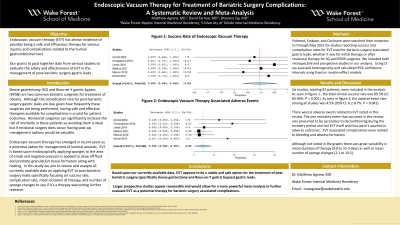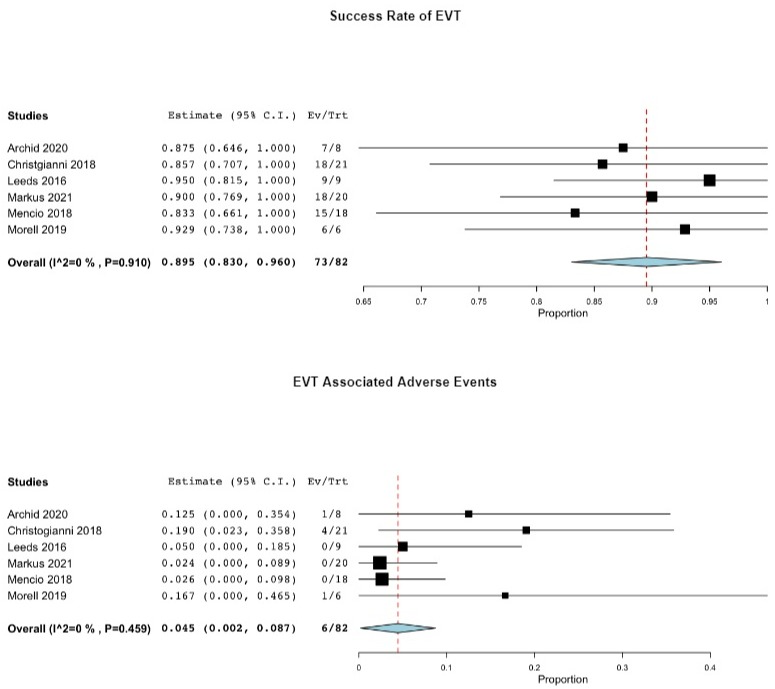Back


Poster Session B - Monday Morning
Category: Obesity
B0631 - Endoscopic Vacuum Therapy for Treatment of Bariatric Surgery Complications: A Systematic Review and Meta-Analysis
Monday, October 24, 2022
10:00 AM – 12:00 PM ET
Location: Crown Ballroom

Has Audio

Matthew M. Agnew, MD
Wake Forest Baptist Health
Winston-Salem, NC
Presenting Author(s)
Matthew M. Agnew, MD1, David Farrow, MD2, Bryanna Jay, MD2
1Wake Forest Baptist Health, Winston-Salem, NC; 2University of Toledo, Toledo, OH
Introduction: Sleeve gastrectomy (SG) and Roux-en-Y gastric bypass (RYGB) are two common bariatric surgeries for treatment of obesity. Although the complication rate for post-bariatric surgery gastric leaks are low, given how frequently these surgeries are being performed, having safe and effective therapies available for complications is crucial for patient outcomes. Revisional surgeries can significantly increase the risk of mortality in these patients so avoiding them is ideal but if revisional surgery does occur, having post-op management options would be valuable. Endoscopic vacuum therapy (EVT) has emerged in recent years as a potential option for management of luminal wounds. EVT is based upon endoscopically applying sponges to the area of a leak and negative pressure is applied to draw off fluid and promote granulation tissue formation along with healing. In this study we aim to review and analyze all currently available data on applying EVT to post-bariatric surgery leaks specifically focusing on success rate, complication rate, mean duration of therapy, and number of sponge changes to see if it’s a therapy warranting further research.
Methods: Pubmed, Embase, and Cochrane were searched from inception to through May 2022 for studies reporting success and complication rates for EVT used for bariatric surgery associated gastric leaks whether it was for initial therapy or after revisional therapy for SG and RYGB surgeries. We included both retrospective and prospective studies in our analysis. Using I2 we assessed heterogeneity and calculated 95% confidence intervals using fixed or random effect models.
Results: Six studies, totaling 81 patients, were included in the analysis. The total clinical success rate was 89.5% (CI: 83-96%. P < 0.001). The adverse event rate among all studies was 4.5% (95% CI: 0.2-8.7%. P = 0.041). There were 6 adverse events related to EVT noted in this review. The one mortality event that occurred in this review was presumed to be secondary to deconditioning during the recovery period and not EVT itself and thus wasn’t counted in adverse outcomes. EVT associated complications were related to bleeding and abscess formation.
Discussion: Based upon our currently available data, EVT appears to be a viable and safe option for the treatment of post-bariatric surgery (specifically SG and RYGB) gastric leaks. Larger prospective studies appear reasonable and would allow for a more powerful meta-analysis to further evaluate EVT as a potential therapy.

Disclosures:
Matthew M. Agnew, MD1, David Farrow, MD2, Bryanna Jay, MD2. B0631 - Endoscopic Vacuum Therapy for Treatment of Bariatric Surgery Complications: A Systematic Review and Meta-Analysis, ACG 2022 Annual Scientific Meeting Abstracts. Charlotte, NC: American College of Gastroenterology.
1Wake Forest Baptist Health, Winston-Salem, NC; 2University of Toledo, Toledo, OH
Introduction: Sleeve gastrectomy (SG) and Roux-en-Y gastric bypass (RYGB) are two common bariatric surgeries for treatment of obesity. Although the complication rate for post-bariatric surgery gastric leaks are low, given how frequently these surgeries are being performed, having safe and effective therapies available for complications is crucial for patient outcomes. Revisional surgeries can significantly increase the risk of mortality in these patients so avoiding them is ideal but if revisional surgery does occur, having post-op management options would be valuable. Endoscopic vacuum therapy (EVT) has emerged in recent years as a potential option for management of luminal wounds. EVT is based upon endoscopically applying sponges to the area of a leak and negative pressure is applied to draw off fluid and promote granulation tissue formation along with healing. In this study we aim to review and analyze all currently available data on applying EVT to post-bariatric surgery leaks specifically focusing on success rate, complication rate, mean duration of therapy, and number of sponge changes to see if it’s a therapy warranting further research.
Methods: Pubmed, Embase, and Cochrane were searched from inception to through May 2022 for studies reporting success and complication rates for EVT used for bariatric surgery associated gastric leaks whether it was for initial therapy or after revisional therapy for SG and RYGB surgeries. We included both retrospective and prospective studies in our analysis. Using I2 we assessed heterogeneity and calculated 95% confidence intervals using fixed or random effect models.
Results: Six studies, totaling 81 patients, were included in the analysis. The total clinical success rate was 89.5% (CI: 83-96%. P < 0.001). The adverse event rate among all studies was 4.5% (95% CI: 0.2-8.7%. P = 0.041). There were 6 adverse events related to EVT noted in this review. The one mortality event that occurred in this review was presumed to be secondary to deconditioning during the recovery period and not EVT itself and thus wasn’t counted in adverse outcomes. EVT associated complications were related to bleeding and abscess formation.
Discussion: Based upon our currently available data, EVT appears to be a viable and safe option for the treatment of post-bariatric surgery (specifically SG and RYGB) gastric leaks. Larger prospective studies appear reasonable and would allow for a more powerful meta-analysis to further evaluate EVT as a potential therapy.

Figure: Success and adverse event rates for EVT
Disclosures:
Matthew Agnew indicated no relevant financial relationships.
David Farrow indicated no relevant financial relationships.
Bryanna Jay indicated no relevant financial relationships.
Matthew M. Agnew, MD1, David Farrow, MD2, Bryanna Jay, MD2. B0631 - Endoscopic Vacuum Therapy for Treatment of Bariatric Surgery Complications: A Systematic Review and Meta-Analysis, ACG 2022 Annual Scientific Meeting Abstracts. Charlotte, NC: American College of Gastroenterology.
